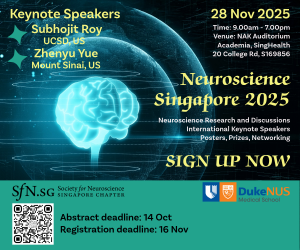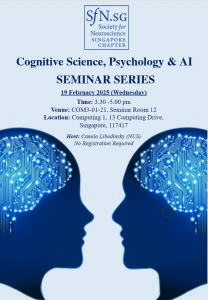Minisymposium on Neurobiology of Sleep and Mental Health Disorders: A Recap
By Matas Vitkauskas
On November 1st, 2023, the SfN Singapore Chapter co-organised a mini-symposium with on Neurobiology of Sleep and Mental Health Disorders at Center for Life Sciences at NUS. The mini-symposium was co-organised with the support of IMCB and the Institute for Digital Medicine (WisDM).
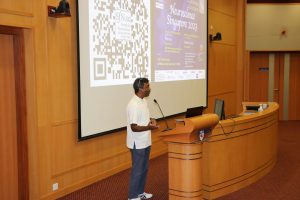 It was a full house with over 130 attendees, who were treated to talks featuring both local and international speakers. The first session in the morning, with Professors Michael Meaney, and Patricia Silveira focused on the genetics and genomics of depression. The speakers in the next session went from flies, to fish, to rodents, and finally to humans discussing very different approaches to study sleep disorders and circadian rhythms using model organisms with different strengths.
It was a full house with over 130 attendees, who were treated to talks featuring both local and international speakers. The first session in the morning, with Professors Michael Meaney, and Patricia Silveira focused on the genetics and genomics of depression. The speakers in the next session went from flies, to fish, to rodents, and finally to humans discussing very different approaches to study sleep disorders and circadian rhythms using model organisms with different strengths.
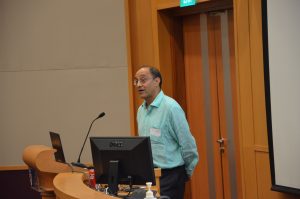 Finally, the last session featured Professors, George Augustine, Thomas Yeo, and Pankaj Sah speaking about the neurobiology of mental health disorders. Professor Sah, the second Keynote speaker for the day delivered a lecture on Engrams in the pre-frontal cortex encoding fear memories.
Finally, the last session featured Professors, George Augustine, Thomas Yeo, and Pankaj Sah speaking about the neurobiology of mental health disorders. Professor Sah, the second Keynote speaker for the day delivered a lecture on Engrams in the pre-frontal cortex encoding fear memories.
Some highlights of the talks I attended
Prof. Micheal Meany discussed the identification of candidate gene networks through which GWAS hits of major depression might be exerting their effects. The discussion involved critical analysis of gene to SNP allocation and analysis of resulting identified gene networks and their co-expression in astrocytes in single-nucleus RNAseq data. The findings suggest fatty acid metabolism and neuroinflammation involvement in major depressive disorder.
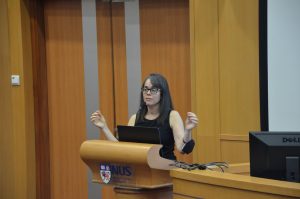 Dr. Patricia Pelufo Silveira, the first Keynote speaker from McGill University discussed the impact of premature birth on mental health and metabolic risk. She conducted studies with adolescents, rodents, and neuroimaging to understand how insulin affects memory and impulsivity. The talk emphasized the importance of gene networks and expression-based polygenic scores in her research.
Dr. Patricia Pelufo Silveira, the first Keynote speaker from McGill University discussed the impact of premature birth on mental health and metabolic risk. She conducted studies with adolescents, rodents, and neuroimaging to understand how insulin affects memory and impulsivity. The talk emphasized the importance of gene networks and expression-based polygenic scores in her research.
Prof. Adam Claridge Chang presented unique findings about fly sleep patterns, challenging conventional beliefs. The speaker analyzed historical inaccuracies in the description of fly sleep, but also his own work on characterizing circadian rhythms. His findings imply that instead of defining sleep as bouts of behavioral quiescence for 5 min, we should instead focus on flies sleeping upside down.
Dr. Joshua J Gooley – Presented on chronotyping approaches used at NUS to characterize the effects of “late-sleepers” versus “early-sleepers” on their academic performance and attendance of lectures. The speaker described novel approaches in the collection of data such as utilizing a Wi-Fi connection as a proxy for attendance and focus during class. His findings suggest NUS administration should make early morning classes optional given the existence of “late-sleepers” in the NUS student body.
Conclusion
As we conclude this report on the Neuroscience Society of Singapore’s Annual General Meeting, we extend our sincere appreciation to all members, organizers, and volunteers who have dedicated their time and efforts to advancing neuroscience research and fostering a vibrant scientific community in Singapore.
Stay tuned for further updates and exciting announcements as we draw closer to the Annual Neuroscience Symposium on December 6th.
Here are some moments from the symposium:


